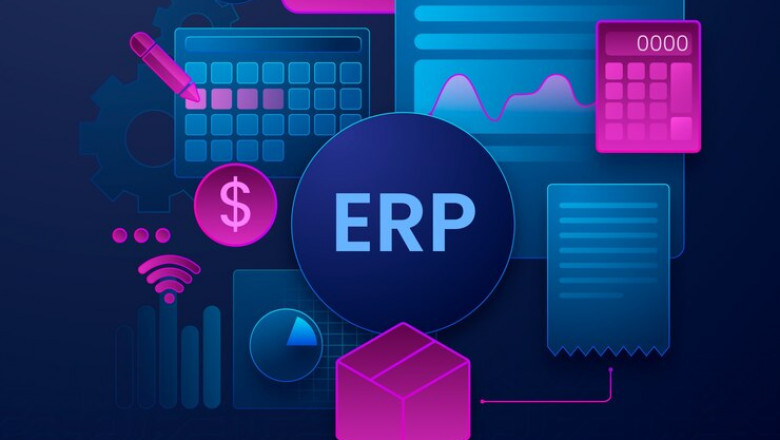views
Introduction
In today's rapidly evolving business landscape, ERP software has become the backbone of successful enterprises across the UAE. With Dubai's position as a global business hub, selecting the right ERP software Dubai solution is critical for streamlining operations, ensuring compliance, and driving growth.
This comprehensive guide explores:
✔ What makes ERP software essential for UAE businesses
✔ Key features of the best ERP software in UAE
✔ Industry-specific solutions for maximum impact
✔ Implementation strategies for seamless adoption
By the end, you'll have a clear roadmap for choosing an ERP system that transforms your business operations and positions you for long-term success.
Why ERP Software is Transforming UAE Businesses
The Digital Imperative
-
78% of UAE companies have adopted or plan to adopt ERP systems
-
Businesses report 40-60% improvement in operational efficiency
-
Cloud ERP adoption grew by 210% in Dubai since 2020
Industry-Specific Impact
| Sector | Key ERP Benefits |
|---|---|
| Retail | Omnichannel inventory management |
| Construction | Project cost tracking & compliance |
| Healthcare | Integrated patient records & billing |
| Logistics | Real-time shipment tracking |
Essential Features of ERP Software Dubai
1. UAE Regulatory Compliance
-
Automated VAT calculations & reporting
-
WPS (Wage Protection System) integration
-
Emiratization tracking tools
2. Arabic-English Bilingual Support
-
Localized interfaces
-
Right-to-left text formatting
-
Arabic financial reporting
3. Cloud Deployment Capabilities
-
24/7 remote access
-
Automatic updates
-
Disaster recovery
4. Industry-Specific Modules
-
Retail: POS & eCommerce integration
-
Manufacturing: Production scheduling
-
Service: Project profitability tracking
5. Advanced Analytics
-
Real-time dashboards
-
AI-powered forecasting
-
Customizable KPIs
Top 5 Best ERP Software in UAE
1. SAP S/4HANA
✅ Best for: Large enterprises
✅ UAE Advantage: Local data centers, Arabic compliance
2. Oracle NetSuite
✅ Best for: Fast-growing businesses
✅ UAE Advantage: Multi-currency, multi-entity
3. Microsoft Dynamics 365
✅ Best for: Microsoft ecosystem users
✅ UAE Advantage: Power BI integration
4. Odoo
✅ Best for: SMEs & startups
✅ UAE Advantage: Affordable modular pricing
5. Zoho ERP
✅ Best for: Small businesses
✅ UAE Advantage: Easy-to-use interface
Implementation Roadmap for UAE Companies
Phase 1: Business Process Mapping
-
Document current workflows
-
Identify pain points
Phase 2: Vendor Evaluation
-
Feature comparison
-
Local support assessment
Phase 3: Data Migration
-
Cleanse legacy data
-
Establish migration protocols
Phase 4: User Training
-
Department-specific programs
-
Administrator certification
Phase 5: Go-Live & Optimization
-
Parallel testing
-
Continuous improvement
Future Trends in ERP Technology
-
AI-powered automation for routine tasks
-
Blockchain integration for secure transactions
-
Voice-enabled ERP interfaces
-
Predictive analytics for decision-making
Conclusion
Choosing the best ERP software in UAE requires careful consideration of:
✔ Business size and complexity
✔ Industry-specific requirements
✔ Compliance needs
✔ Growth projections
The right ERP solution can deliver:
-
30-50% reduction in operational costs
-
40-60% improvement in process efficiency
-
100% regulatory compliance
In Dubai's competitive market, ERP systems aren't just software – they're strategic assets that drive digital transformation and sustainable growth.
FAQs About ERP Software in UAE
1. What's the difference between cloud and on-premise ERP?
Cloud ERP offers remote access with subscription pricing, while on-premise provides more control with higher upfront costs.
2. How long does ERP implementation take in Dubai?
Typically 6-18 months depending on business size and complexity.
3. Can ERP software handle UAE VAT compliance?
Yes, top solutions include FTA-approved VAT modules with auto-filing capabilities.
4. What's the average cost of ERP software in UAE?
-
SMEs: AED 50,000 - 200,000 annually
-
Enterprises: AED 500,000+
5. Is Arabic language support important for UAE ERP?
Critical for government compliance and user adoption across Arabic-speaking staff.














Comments
0 comment